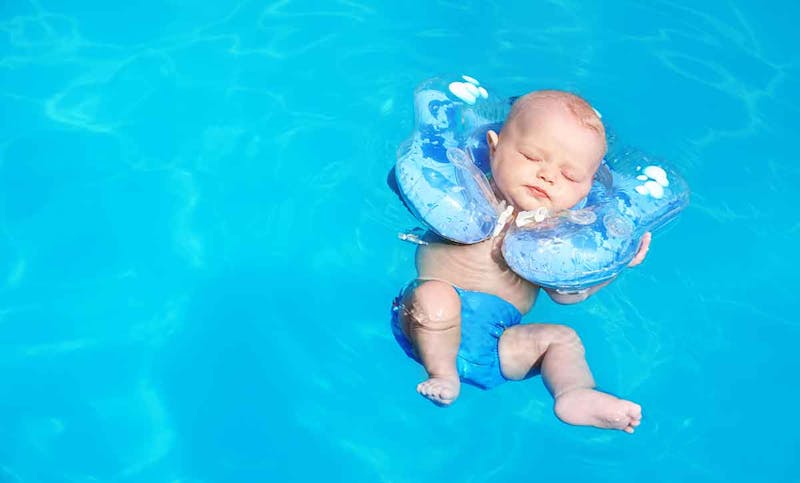
The U.S. Food and Drug Administration (FDA) is warning parents and caregivers not to use baby neck floats due to the risk of death or serious injury.
Baby neck floats — a questionably designed infant product — look similar to inflatable innertubes that older children use for water play. But instead of being worn around a child’s waist, these inflatable plastic rings are worn around a baby’s neck. They are designed to “cradle” a baby’s head, while their body moves freely in the water, according to the FDA.
Neck floats are sold by major retailers including Amazon and Walmart, as well as pool stores and other niche retailers for children. They have been marketed for babies as young as two weeks old, and even for premature babies. A search of YouTube and other social media sites reveals numerous videos and photos of seemingly happy babies dangling in water in neck floats along with glowing product reviews by parents. Many of the videos have been viewed tens of thousands of times.
To be clear: While neck floats look fun, they are plainly dangerous. The FDA’s warning, issued on June 28, 2022, states that it is aware of one baby who died and another who was hospitalized related to the use of neck floats. In both incidents, the babies were injured when their caregivers “were not directly monitoring them,” according to the FDA.
The warning raises the possibility that there are more incidents that have not been reported. The FDA is requesting that parents, caregivers and healthcare providers report neck float injuries so that it can identify and better understand the risks associated with this product.
What Are the Risks of Using Baby Neck Floats?
According to the FDA, the risks of using baby neck floats include death due to drowning and suffocation, strain, and injury to a baby’s neck. Babies with special needs such as spina bifida or SMA Type 1 may be at an increased risk for serious injury.
In a widely reported incident in 2020, a one-month-old baby in China died from asphyxiation from using a neck float under the supervision of her mother and grandmother. The mother and grandmother had placed the baby in a neck float and allowed her to swim for 10 minutes unassisted in a makeshift pool. When they removed the baby from the neck float, they noticed marks on her neck but assumed that she was asleep. It was not until hours later when the father came home and found the baby unresponsive that they realized something was wrong and rushed her to the hospital. It was too late to save her.
In the aftermath of the incident, a physician from The First Department of Critical Care Medicine at Hunan Children’s Hospital commented to the media: “It is particularly easy to strangle the neck. In addition, the baby’s weight may cause suffocation when it is pressed down.”
And, of course, neck floats — like all air-filled water flotation devices — can potentially deflate, putting a baby at risk of drowning. In 2015, Otteroo Corp. in conjunction with the U.S. Consumer Product Safety Commission recalled 3,000 Otteroo Inflatable Baby Floats after the company received 54 reports of broken seams on these neck floats. Fortunately, no injuries were reported.
The American Academy of Pediatrics (AAP) advises parents not to use air-filled swimming aids (such as inflatable arm bands, neck rings, or “floaties”) in place of U.S. Coast Guard-approved life jackets. Air-filled aids can deflate and are not designed to keep swimmers safe, the AAP warns.
Are Baby Neck Floats Safe for Water Therapy?
The FDA states in its warning that it is aware that some manufacturers claim that neck floats support water therapy interventions in babies with developmental delays or special needs and that the floats promote increased muscle tone, greater flexibility and range of motion, increased lung capacity, better sleep quality, and increased brain and nervous system stimulation. However, the safety and effectiveness of neck floats to build strength, to promote motor development or as a physical therapy tool, have not been established, according to the FDA.
With respect to babies with developmental delays or special needs, the FDA warns that the use of neck floats can lead to death or serious injury and increased risk of neck strain and injury.
What Should I Do If My Child Has Been Injured by a Baby Neck Float?
Alan M Feldman, a co-founding partner and product liability attorney at Feldman Shepherd, recommends contacting a product liability attorney as soon as possible if your child has been injured by a baby neck float. When questioned about the design of this class of products, Feldman said, “suspending a small child by the neck is hazardous and ignores the real risk of asphyxiation as well as other injury modes. Manufacturers should know better than to design products like this.”
Feldman’s team at Feldman Shepherd, which includes partners Daniel J. Mann and Edward S. Goldis, have secured substantial recoveries on behalf of infants and young children who have been seriously injured or killed by children’s products, including baby slings, unstable furniture and magnetic toys.

